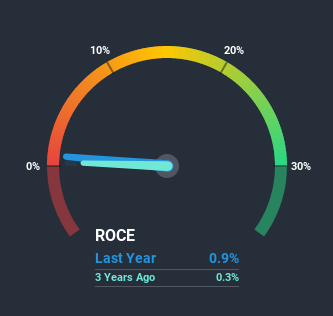- Singapore
- /
- Basic Materials
- /
- SGX:BAZ
What Can The Trends At Lion Asiapac (SGX:BAZ) Tell Us About Their Returns?
If we want to find a potential multi-bagger, often there are underlying trends that can provide clues. Typically, we'll want to notice a trend of growing return on capital employed (ROCE) and alongside that, an expanding base of capital employed. This shows us that it's a compounding machine, able to continually reinvest its earnings back into the business and generate higher returns. So on that note, Lion Asiapac (SGX:BAZ) looks quite promising in regards to its trends of return on capital.
Understanding Return On Capital Employed (ROCE)
For those that aren't sure what ROCE is, it measures the amount of pre-tax profits a company can generate from the capital employed in its business. The formula for this calculation on Lion Asiapac is:
Return on Capital Employed = Earnings Before Interest and Tax (EBIT) ÷ (Total Assets - Current Liabilities)
0.0088 = S$663k ÷ (S$79m - S$4.4m) (Based on the trailing twelve months to September 2020).
So, Lion Asiapac has an ROCE of 0.9%. In absolute terms, that's a low return and it also under-performs the Basic Materials industry average of 9.3%.
See our latest analysis for Lion Asiapac

Historical performance is a great place to start when researching a stock so above you can see the gauge for Lion Asiapac's ROCE against it's prior returns. If you're interested in investigating Lion Asiapac's past further, check out this free graph of past earnings, revenue and cash flow.
What The Trend Of ROCE Can Tell Us
Lion Asiapac has broken into the black (profitability) and we're sure it's a sight for sore eyes. The company now earns 0.9% on its capital, because five years ago it was incurring losses. While returns have increased, the amount of capital employed by Lion Asiapac has remained flat over the period. So while we're happy that the business is more efficient, just keep in mind that could mean that going forward the business is lacking areas to invest internally for growth. After all, a company can only become a long term multi-bagger if it continually reinvests in itself at high rates of return.
On a related note, the company's ratio of current liabilities to total assets has decreased to 5.5%, which basically reduces it's funding from the likes of short-term creditors or suppliers. This tells us that Lion Asiapac has grown its returns without a reliance on increasing their current liabilities, which we're very happy with.
What We Can Learn From Lion Asiapac's ROCE
To bring it all together, Lion Asiapac has done well to increase the returns it's generating from its capital employed. And investors seem to expect more of this going forward, since the stock has rewarded shareholders with a 69% return over the last five years. With that being said, we still think the promising fundamentals mean the company deserves some further due diligence.
If you'd like to know about the risks facing Lion Asiapac, we've discovered 1 warning sign that you should be aware of.
If you want to search for solid companies with great earnings, check out this free list of companies with good balance sheets and impressive returns on equity.
If you decide to trade Lion Asiapac, use the lowest-cost* platform that is rated #1 Overall by Barron’s, Interactive Brokers. Trade stocks, options, futures, forex, bonds and funds on 135 markets, all from a single integrated account. Promoted
New: AI Stock Screener & Alerts
Our new AI Stock Screener scans the market every day to uncover opportunities.
• Dividend Powerhouses (3%+ Yield)
• Undervalued Small Caps with Insider Buying
• High growth Tech and AI Companies
Or build your own from over 50 metrics.
This article by Simply Wall St is general in nature. It does not constitute a recommendation to buy or sell any stock, and does not take account of your objectives, or your financial situation. We aim to bring you long-term focused analysis driven by fundamental data. Note that our analysis may not factor in the latest price-sensitive company announcements or qualitative material. Simply Wall St has no position in any stocks mentioned.
*Interactive Brokers Rated Lowest Cost Broker by StockBrokers.com Annual Online Review 2020
Have feedback on this article? Concerned about the content? Get in touch with us directly. Alternatively, email editorial-team (at) simplywallst.com.
About SGX:BAZ
Lion Asiapac
An investment holding company, engages in lime manufacturing and sales activities in Malaysia and Singapore.
Excellent balance sheet and good value.
Market Insights
Community Narratives


Recently Updated Narratives


MINISO's fair value is projected at 26.69 with an anticipated PE ratio shift of 20x


The Quiet Giant That Became AI’s Power Grid


Nova Ljubljanska Banka d.d will expect a 11.2% revenue boost driving future growth
Popular Narratives


The company that turned a verb into a global necessity and basically runs the modern internet, digital ads, smartphones, maps, and AI.


MicroVision will explode future revenue by 380.37% with a vision towards success



